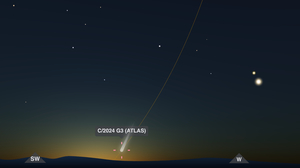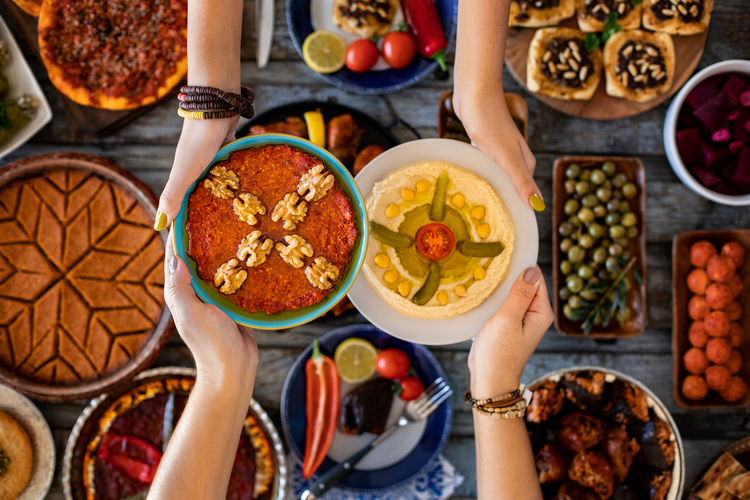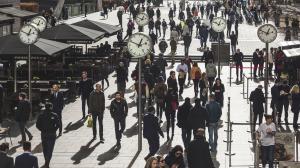
Best Comet of 2025?
C/2024 G3 (ATLAS) has already become very faintly visible to the naked eye for observers in the Southern Hemisphere.
For Muslims around the world, Eid ul Fitr marks the end of Ramadan, the Islamic holy month of fasting and prayer. It is one of the largest and most important celebrations in the Islamic calendar.

Eid ul Fitr is a time to share great food with family and friends.
©iStockphoto.com/Gulcin Ragiboglu
Eid ul Fitr is a major Islamic holiday that marks the end of Ramadan. People celebrate having accomplished the fast of Ramadan (sawm), which is one of the most challenging religious duties for Muslims and one of the five pillars of Islam.
Eid ul Fitr translates as “Festival of Breaking the Fast.” It is sometimes referred to as the “lesser Eid” or “smaller Eid,” whereas Eid ul Adha is called the “greater” or “big Eid.”
Eid ul Fitr falls on the first day of Shawwal, the 10th month of the Islamic calendar. Since Muslims follow a lunar calendar, where a year is approximately 11 days shorter than a solar year, Eid falls on an earlier date in the western Gregorian calendar each year.
A new month in the Muslim calendar begins when the Waxing Crescent Moon becomes visible after the New Moon phase. An authorized committee has to confirm the Moon sighting.
While Eid ul Fitr itself lasts only one day, the day following the holy month of Ramadan, it is also celebrated in the days that follow in some countries and Muslim communities. Festivities can last for up to three days.
Eid ul Fitr is a national holiday in many Muslim countries, such as Saudi Arabia, the United Arab Emirates, and many more.
Our holiday pages have up-to-date information for countries worldwide.
Eid ul Fitr traditions vary from country to country, but you are sure to hear people wishing each other Eid Mubarak, meaning Happy Eid or Blessed Eid.
Do you want to wish someone Happy Eid, but you’re not a Muslim? Don’t be shy! Eid is a day of goodwill and respect, so wishing someone Eid Mubarak or Happy Eid will most likely at least earn you a smile, if not an invitation to a lavish Eid feast.
Eid al Fitr is a joyous occasion. People dress up nicely, often wear new clothes, and celebrate together with family members and friends.
Apart from that, Eid al-Fitr celebrations take on many different forms worldwide, but there are also some common elements:
Celebrating the end of the fasting naturally involves great food—and lots of it! In fact, the Quran forbids fasting on this day. The feast features a wide array of special foods, which vary depending on the country. The following list covers just a tiny fraction of the traditional Eid ul Fitr cuisine:
 Turkey:
Turkey: India:
India: Iraq:
Iraq: Indonesia:
Indonesia:Did you notice that a lot of these dishes are sweet? That’s the reason why Eid ul Fitr is also referred to as the Sugar Feast.
Muslims are also expected to give to charity on this occasion. This tradition is called Zakat al-Fitr and constitutes another of the five pillars of Islam.
Alms—gifts of food or money—are usually given a few days before the feast to enable those in need to partake in the celebrations.
Eid ul Fitr is a big celebration—but it also has a religious component. Muslims traditionally congregate in an open area to say special prayers asking Allah for peace and blessings for all people around the world.
If you search the internet for this holiday, you will encounter a number of different spellings. Eid ul Fitr and Eid al Fitr are most common, but there’s also Id al Fitr and even Idul Fitri. Some sources just call it Eid.
So, which one is correct? And, how come there’s so much disagreement about the spelling? Well, the name derives from the Arabic عيد الفطر, meaning “feast of breaking the fast,” so it has to be converted from Arabic writing to the Latin alphabet in a process called transliteration.
This is where the different spellings come in: there are different methods of transliterating a text, and while Eid ul Fitr is spelled differently than Eid al Fitr, the pronunciation is about the same.
Idul Fitri is a slightly different name used in countries like Indonesia and Malaysia.
As for referring to the holiday simply as Eid, it’s not incorrect, but it can lead to confusion. The Arabic word عيد (Eid) translates as “feast,” so if the context is missing, it may not be clear which feast you mean. Eid al-Adha is another major Islamic festival—and it is also commonly referred to as Eid.
Scholars generally agree that Prophet Muhammad introduced the feast, although the timing is debated. According to some traditions, he initiated both Eid ul Fitr and Eid ul Adha after his journey (Hijrah) from Mecca (Makkah) to Medina in 622 CE.

C/2024 G3 (ATLAS) has already become very faintly visible to the naked eye for observers in the Southern Hemisphere.

How does the 12-hour clock system work? Is midnight 12 am or 12 pm?

Why do many countries set the clocks back and forth an hour twice a year?

Why are there 12 months? How long are they, and what do the month names mean?